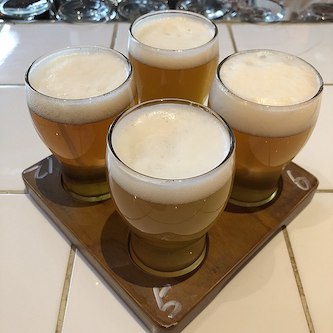Charles Denby, the co-founder and CEO of Berkeley Yeast, is dedicated to enhancing the flavor of beer through genetic modification. His company specializes in altering yeast strains to introduce new flavors and eliminate undesirable ones. For instance, their Tropics yeast is engineered to impart the taste of passion fruit and guava, providing a consistent flavor profile without the need for additional ingredients. While these genetically modified (GM) yeasts are widely used in the US, they face regulatory constraints in many countries, including the UK.
Berkeley Yeast’s GM yeasts have found applications beyond flavor enhancement. They have developed strains that can eliminate off flavors and expedite the production of certain beer styles. Despite the potential benefits, the use of GM technology in brewing remains controversial, with concerns about consumer perception and regulatory approval. Some brewers, like Lagunitas Brewing, are cautious about adopting GM yeasts due to consumer apprehensions and the association of GM foods with certain companies.
In contrast, Carlsberg, a major beer producer, has adopted a no-GM policy, focusing on natural breeding methods to develop barley and hops varieties that are more resilient to environmental stress. This approach aligns with the company’s commitment to traditional methods and consumer preferences. The debate surrounding GM beers reflects the divergent approaches within the brewing industry, with some embracing genetic engineering while others prioritize natural breeding methods.
Looking ahead, proponents of GM beers envision creating brews with extended freshness and consistent flavors. Despite the ongoing debate and regulatory challenges, the potential for GM technology to revolutionize the brewing industry is a topic of interest and speculation. As the industry continues to evolve, the coexistence of GM and non-GM brewing methods underscores the complex dynamics shaping the future of beer production.
Original news source: Would you drink genetically modified beer? (BBC)
Listen
Slow
Normal
Fast
Group or Classroom Activities
Warm-up Activities:
– News Summary
Instructions: Students will work in pairs to summarize the article in their own words, aiming for a brief summary of about 100 words. Encourage them to highlight the main points regarding genetic modification in beer production, the different approaches by companies like Berkeley Yeast and Carlsberg, and the potential future of GM beers. After writing, each pair will share their summary with another pair and discuss any differences or similarities in what they identified as key information.
– Opinion Spectrum
Instructions: Create a line in the classroom representing a spectrum of opinions from “strongly agree” to “strongly disagree.” Read out statements related to the article, such as “Genetic modification should be widely adopted in beer production,” or “Consumer apprehensions about GM beers are unjustified.” Students will position themselves along the spectrum based on their opinion and then discuss with the person closest to them why they chose their position. This activity encourages students to articulate and defend their opinions on the topic.
– Vocabulary Pictionary
Instructions: Write down key terms from the article (e.g., genetic modification, flavor profile, regulatory constraints, natural breeding methods) on slips of paper. Students will take turns drawing a term from a hat and then sketching it on the board without using any letters or verbal hints. Their team has to guess the term based on the drawing. This will help reinforce the new vocabulary from the article in a fun and interactive way.
– Future Predictions
Instructions: Students will work in small groups to discuss and write down their predictions about the future of beer production based on the article. They should consider questions such as: Will GM beers become the norm, or will natural brewing methods prevail? How might consumer tastes evolve? What technological advancements could emerge? Each group will then present their predictions to the class, sparking a discussion on the plausible outcomes for the brewing industry.
– Synonym Challenge
Instructions: Provide students with a list of key words from the article (e.g., enhance, alter, expedite, controversial, resilient). In pairs or small groups, students must come up with at least two synonyms for each word without using dictionaries. After a set amount of time, review the synonyms as a class and discuss any nuances in meaning between the synonyms and the original words. This activity will expand students’ vocabulary and enhance their understanding of the article’s language.
Comprehension Questions:
1. What is Charles Denby’s role at Berkeley Yeast?
2. What is the primary focus of Berkeley Yeast’s genetic modification of yeast strains?
3. How does the Tropics yeast strain affect the flavor of beer?
4. Why are genetically modified yeasts facing regulatory constraints in the UK?
5. What are some concerns that have been raised about the use of GM technology in brewing?
6. How does Lagunitas Brewing’s stance on GM yeasts reflect broader consumer concerns?
7. What is Carlsberg’s policy on the use of genetically modified organisms in their brewing process?
8. What future possibilities do proponents of GM beers see for the technology in the brewing industry?
Go to answers ⇩
Listen and Fill in the Gaps:
Charles Denby, the co-founder and CEO of Berkeley Yeast, is dedicated to (1)______ the flavor of beer through genetic modification. His company specializes in altering yeast strains to introduce new flavors and eliminate undesirable ones. For instance, their Tropics yeast is engineered to impart the (2)______ of (3)______ fruit and guava, providing a consistent flavor profile without the need for additional ingredients. While these genetically (4)______ (GM) yeasts are widely used in the US, they face regulatory constraints in many countries, including the UK.
Berkeley Yeast’s GM yeasts have (5)______ applications beyond flavor enhancement. They have (6)______ strains that can eliminate off flavors and expedite the production of certain beer styles. Despite the (7)______ benefits, the use of GM technology in brewing remains controversial, with concerns about consumer perception and regulatory approval. Some brewers, like Lagunitas Brewing, are cautious about (8)______ GM yeasts due to consumer apprehensions and the (9)______ of GM foods with certain (10)______.
In contrast, Carlsberg, a major beer producer, has adopted a no-GM policy, focusing on natural breeding (11)______ to develop barley and hops varieties that are more resilient to environmental stress. This approach aligns with the company’s commitment to traditional methods and consumer preferences. The debate surrounding GM beers reflects the divergent approaches within the (12)______ industry, with some embracing genetic engineering while others prioritize natural (13)______ methods.
Looking ahead, proponents of GM (14)______ envision creating brews with extended freshness and consistent flavors. Despite the ongoing debate and regulatory challenges, the potential for GM technology to revolutionize the brewing industry is a topic of interest and speculation. As the industry continues to evolve, the coexistence of GM and non-GM brewing methods underscores the (15)______ dynamics shaping the (16)______ of beer production.
Go to answers ⇩
Discussion Questions:
Students can ask a partner these questions, or discuss them as a group.
1. What is your opinion on the use of genetic modification in food and beverages?
2. How would you feel if you found out your favorite beer was made with genetically modified yeast?
3. Do you think that the benefits of using GM yeast in beer production outweigh the potential risks? Why or why not?
4. What is your stance on the debate between using natural breeding methods versus genetic modification in agriculture?
5. Have you ever tried a beer with unconventional flavors like passion fruit or guava? If so, did you enjoy it?
6. How important is it for you that the ingredients in your beer are all-natural?
7. Do you believe that GM foods should be labeled as such, and would this influence your purchasing decisions? Why or why not?
8. What is your perspective on the regulatory constraints faced by GM products in different countries?
9. Do you think consumer apprehensions about GM foods are justified? Why or why not?
10. How would you feel about a beer that has a longer shelf life due to genetic modification?
11. Do you prefer traditional brewing methods or are you open to the innovation of genetic engineering in beer production?
12. What is the most important factor for you when choosing a beer: flavor, brewing method, brand reputation, or ingredient sourcing?
13. Do you think the brewing industry should focus more on sustainability and environmental stress resilience in their crops?
14. How do you think the coexistence of GM and non-GM brewing methods will shape the future of the beer industry?
15. Do you think there is enough information available for consumers to make an informed decision about GM beers? Why or why not?
Individual Activities
Vocabulary Meanings:
Match each word to its meaning.
Words:
1. Berkeley
2. genetic
3. flavors
4. Tropics
5. regulatory
6. applications
7. consumer
8. brewing
Meanings:
(a) The process of making beer
(b) The company specializing in yeast modification
(c) Different uses or purposes
(d) A specific yeast engineered for a certain taste
(e) A person who buys goods or services
(f) Different varieties of tastes
(g) Relating to the study of genes
(h) Relating to rules and restrictions
Go to answers ⇩
Multiple Choice Questions:
1. What is Berkeley Yeast’s specialty?
(a) Brewing beer with traditional methods
(b) Altering yeast strains for flavor enhancement
(c) Developing non-GM barley and hops varieties
(d) Eliminating off flavors in beer
2. Why do Berkeley Yeast’s GM yeasts face regulatory constraints in many countries?
(a) Lack of consistent flavor profile
(b) High production costs
(c) Inability to eliminate off flavors
(d) Concerns about consumer perception and regulatory approval
3. What is Carlsberg’s approach to developing barley and hops varieties?
(a) Genetic modification
(b) Natural breeding methods
(c) Rapid production techniques
(d) Consumer preference-based methods
4. Why is Lagunitas Brewing cautious about adopting GM yeasts?
(a) Consumer apprehensions and the association of GM foods with certain companies
(b) Regulatory constraints in many countries
(c) Lack of potential benefits
(d) Inability to expedite the production of certain beer styles
5. What do proponents of GM beers envision for the future of brewing?
(a) Reduced consumer preferences
(b) Increased regulatory challenges
(c) Extended freshness and consistent flavors
(d) Elimination of traditional brewing methods
6. What does the debate surrounding GM beers reflect within the brewing industry?
(a) Universal acceptance of GM technology
(b) Lack of interest and speculation in GM beers
(c) Divergent approaches, with some embracing genetic engineering while others prioritize natural breeding methods
(d) Inability to coexist with non-GM brewing methods
7. What is the potential benefit of GM technology in the brewing industry?
(a) Creating regulatory challenges
(b) Eliminating consumer preferences
(c) Increasing consumer apprehensions
(d) Revolutionizing the brewing industry with extended freshness and consistent flavors
8. What does the coexistence of GM and non-GM brewing methods underscore?
(a) The complex dynamics shaping the future of beer production
(b) The universal acceptance of GM technology
(c) The lack of interest and speculation in GM beers
(d) The elimination of traditional brewing methods
Go to answers ⇩
True or False Questions:
1. GM yeasts developed by Berkeley Yeast have applications beyond flavor enhancement, including eliminating off flavors and expediting the production of certain beer styles.
2. Charles Denby is not the co-founder and CEO of Berkeley Yeast, a company dedicated to enhancing the flavor of beer through genetic modification.
3. Lagunitas Brewing is not cautious about adopting GM yeasts due to consumer apprehensions and the association of GM foods with certain companies.
4. Berkeley Yeast does not specialize in altering yeast strains to introduce new flavors and eliminate undesirable ones, such as their Tropics yeast engineered to impart the taste of passion fruit and guava.
5. While Berkeley Yeast’s GM yeasts are widely used in the US, they face regulatory constraints in many countries, including the UK.
6. Proponents of GM beers envision creating brews with extended freshness and consistent flavors, despite ongoing debate and regulatory challenges.
7. The debate surrounding GM beers does not reflect the divergent approaches within the brewing industry, with some embracing genetic engineering while others prioritize natural breeding methods.
8. Carlsberg, a major beer producer, has adopted a no-GM policy, focusing on natural breeding methods to develop barley and hops varieties that are more resilient to environmental stress.
Go to answers ⇩
Write a Summary:
Write a summary of this news article in two sentences.
Check your writing now with the best free AI for English writing!
Writing Questions:
Answer the following questions. Write as much as you can for each answer.
Check your answers with our free English writing assistant!
1. What is the primary goal of Charles Denby and Berkeley Yeast in the beer industry?
2. How does the Tropics yeast developed by Berkeley Yeast enhance the flavor of beer?
3. What are the concerns and reasons some brewers, like Lagunitas Brewing, are hesitant to use GM yeasts?
4. What alternative approach has Carlsberg taken in developing their beer ingredients, and why?
5. What are the potential benefits of GM beers that proponents are excited about, despite the controversies and regulatory hurdles?
Answers
Comprehension Question Answers:
1. What is Charles Denby’s role at Berkeley Yeast?
Charles Denby is the co-founder and CEO of Berkeley Yeast.
2. What is the primary focus of Berkeley Yeast’s genetic modification of yeast strains?
The primary focus is to alter yeast strains to introduce new flavors and eliminate undesirable ones in beer.
3. How does the Tropics yeast strain affect the flavor of beer?
The Tropics yeast strain is engineered to impart the taste of passion fruit and guava, providing a consistent flavor profile without the need for additional ingredients.
4. Why are genetically modified yeasts facing regulatory constraints in the UK?
The article does not specify the exact reasons, but it implies that there are regulatory constraints in the UK that limit the use of genetically modified yeasts.
5. What are some concerns that have been raised about the use of GM technology in brewing?
Concerns include consumer perception and regulatory approval, with some consumers apprehensive about GM foods and their association with certain companies.
6. How does Lagunitas Brewing’s stance on GM yeasts reflect broader consumer concerns?
Lagunitas Brewing is cautious about adopting GM yeasts due to consumer apprehensions and the negative associations of GM foods with certain companies.
7. What is Carlsberg’s policy on the use of genetically modified organisms in their brewing process?
Carlsberg has adopted a no-GM policy, focusing on natural breeding methods to develop barley and hops varieties.
8. What future possibilities do proponents of GM beers see for the technology in the brewing industry?
Proponents envision creating brews with extended freshness and consistent flavors, potentially revolutionizing the brewing industry.
Go back to questions ⇧
Listen and Fill in the Gaps Answers:
(1) enhancing
(2) taste
(3) passion
(4) modified
(5) found
(6) developed
(7) potential
(8) adopting
(9) association
(10) companies
(11) methods
(12) brewing
(13) breeding
(14) beers
(15) complex
(16) future
Go back to questions ⇧
Vocabulary Meanings Answers:
1. Berkeley
Answer: (b) The company specializing in yeast modification
2. genetic
Answer: (g) Relating to the study of genes
3. flavors
Answer: (f) Different varieties of tastes
4. Tropics
Answer: (d) A specific yeast engineered for a certain taste
5. regulatory
Answer: (h) Relating to rules and restrictions
6. applications
Answer: (c) Different uses or purposes
7. consumer
Answer: (e) A person who buys goods or services
8. brewing
Answer: (a) The process of making beer
Go back to questions ⇧
Multiple Choice Answers:
1. What is Berkeley Yeast’s specialty?
Answer: (b) Altering yeast strains for flavor enhancement
2. Why do Berkeley Yeast’s GM yeasts face regulatory constraints in many countries?
Answer: (d) Concerns about consumer perception and regulatory approval
3. What is Carlsberg’s approach to developing barley and hops varieties?
Answer: (b) Natural breeding methods
4. Why is Lagunitas Brewing cautious about adopting GM yeasts?
Answer: (a) Consumer apprehensions and the association of GM foods with certain companies
5. What do proponents of GM beers envision for the future of brewing?
Answer: (c) Extended freshness and consistent flavors
6. What does the debate surrounding GM beers reflect within the brewing industry?
Answer: (c) Divergent approaches, with some embracing genetic engineering while others prioritize natural breeding methods
7. What is the potential benefit of GM technology in the brewing industry?
Answer: (d) Revolutionizing the brewing industry with extended freshness and consistent flavors
8. What does the coexistence of GM and non-GM brewing methods underscore?
Answer: (a) The complex dynamics shaping the future of beer production
Go back to questions ⇧
True or False Answers:
1. GM yeasts developed by Berkeley Yeast have applications beyond flavor enhancement, including eliminating off flavors and expediting the production of certain beer styles. (Answer: True)
2. Charles Denby is not the co-founder and CEO of Berkeley Yeast, a company dedicated to enhancing the flavor of beer through genetic modification. (Answer: False)
3. Lagunitas Brewing is not cautious about adopting GM yeasts due to consumer apprehensions and the association of GM foods with certain companies. (Answer: False)
4. Berkeley Yeast does not specialize in altering yeast strains to introduce new flavors and eliminate undesirable ones, such as their Tropics yeast engineered to impart the taste of passion fruit and guava. (Answer: False)
5. While Berkeley Yeast’s GM yeasts are widely used in the US, they face regulatory constraints in many countries, including the UK. (Answer: True)
6. Proponents of GM beers envision creating brews with extended freshness and consistent flavors, despite ongoing debate and regulatory challenges. (Answer: True)
7. The debate surrounding GM beers does not reflect the divergent approaches within the brewing industry, with some embracing genetic engineering while others prioritize natural breeding methods. (Answer: False)
8. Carlsberg, a major beer producer, has adopted a no-GM policy, focusing on natural breeding methods to develop barley and hops varieties that are more resilient to environmental stress. (Answer: True)
Go back to questions ⇧















